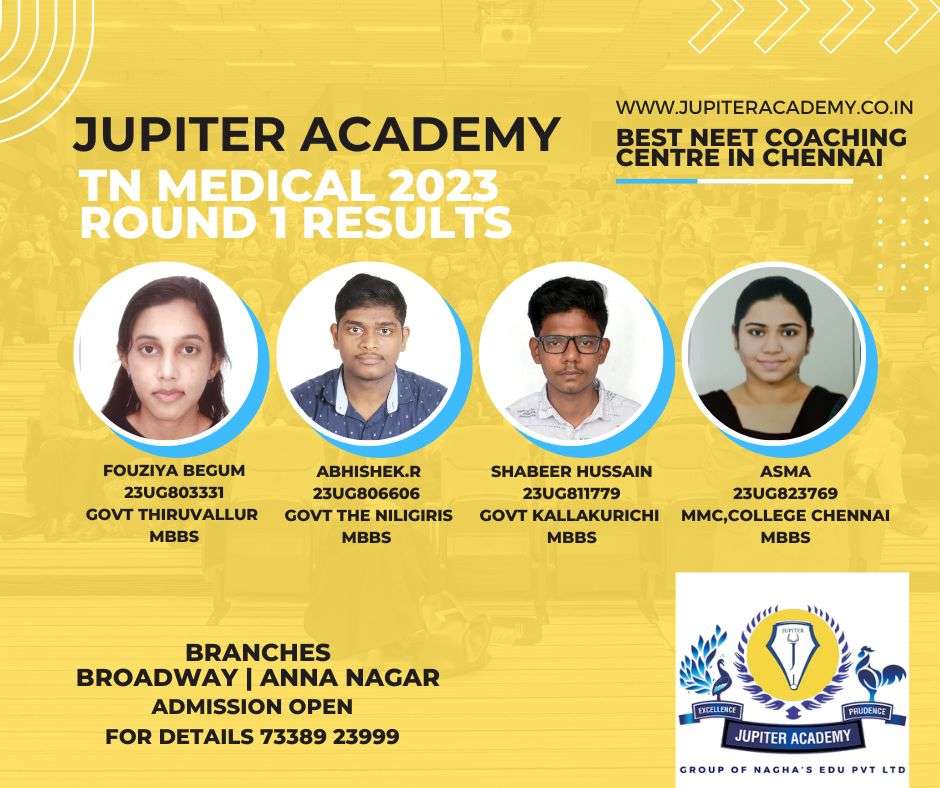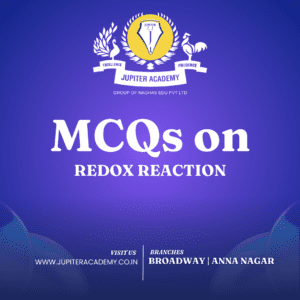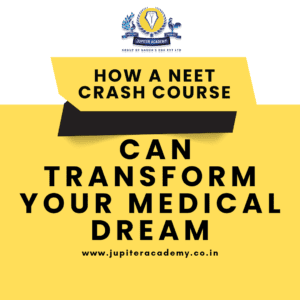NEET Crash Course | Jupiter Academy JupiterAcademy Chennai’s Leading NEET...
Read MoreNEET MCQS ON REDOX REACTION

Redox reactions are important in the NEET exam because they are involved in many biological processes, such as respiration, photosynthesis, and cellular metabolism. They are also involved in many chemical reactions that are used in industrial processes, such as the production of fuels and fertilizers.
Here are some of the topics related to redox reactions that are important in the NEET exam:
- Oxidation and reduction: These are the two processes that occur during a redox reaction. Oxidation is the loss of electrons, while reduction is the gain of electrons.
- Oxidizing agents and reducing agents: These are the substances that undergo oxidation and reduction, respectively.
- Half-reactions: These are the two parts of a redox reaction that show the oxidation and reduction processes separately.
- Balancing redox reactions: This is the process of ensuring that the number of electrons lost is equal to the number of electrons gained.
Redox reactions are oxidation-reduction chemical reactions in which the reactants undergo a change in their oxidation states. The term ‘redox’ is a short form of reduction-oxidation. All the redox reactions can be broken down into two different processes: a reduction process and an oxidation process.

The oxidation and reduction reactions always occur simultaneously in redox or oxidation-reduction reactions. The substance getting reduced in a chemical reaction is known as the oxidizing agent, while a substance that is getting oxidized is known as the reducing agent.
NEET MCQS ON REDOX REACTION
some multiple-choice questions (MCQs) related to redox reactions that are commonly encountered in the context of the NEET (National Eligibility cum Entrance Test) for medical and dental admissions in India. Please keep in mind that the difficulty level of these questions may vary, so I’ll provide a mix of easier and more challenging questions.
1. Which of the following statements is true regarding redox reactions?
a) Oxidation involves a gain of electrons.
b) Reduction involves a loss of electrons.
c) Oxidizing agents are reduced in a reaction.
d) Reducing agents are oxidized in a reaction.
2. In the reaction: 2KClO3 -> 2KCl + 3O2, identify the substance that gets reduced.
a) KClO3
b) KCl
c) O2
d) Both KClO3 and KCl
3. What is the oxidation state of chlorine in HClO3?
a) +1
b) +3
c) +5
d) -1
4. In the reaction: 2Fe2O3 + 3C -> 4Fe + 3CO2, which substance is undergoing oxidation?
a) Fe2O3
b) C
c) Fe
d) CO2
5. Which of the following substances is a good reducing agent?
a) H2O2
b) Cl2
c) Na
d) HNO3
6. In the reaction: MnO4^- + 8H+ + 5e^- -> Mn^2+ + 4H2O, what is the species that gets reduced?
a) MnO4^-
b) H+
c) Mn^2+
d) H2O
7. What is the balanced equation for the redox reaction between hydrogen peroxide (H2O2) and potassium dichromate (K2Cr2O7) in an acidic medium?
a) 3H2O2 + 2K2Cr2O7 + 4H2SO4 -> 3O2 + 4CrSO4 + 4K2SO4 + 8H2O
b) 5H2O2 + 6K2Cr2O7 + 7H2SO4 -> 7O2 + 6CrSO4 + 4K2SO4 + 16H2O
c) 3H2O2 + 2K2Cr2O7 + 4H2SO4 -> 4CrSO4 + 4K2SO4 + 8H2O
d) 5H2O2 + 6K2Cr2O7 + 7H2SO4 -> 3O2 + 6CrSO4 + 4K2SO4 + 8H2O
Answers:
1. d) Reducing agents are oxidized in a reaction.
2. a) KClO3
3. c) +5
4. b) C
5. c) Na
6. a) MnO4^-
7. c) 3H2O2 + 2K2Cr2O7 + 4H2SO4 -> 4CrSO4 + 4K2SO4 + 8H2O
some multiple-choice questions (MCQs) related to redox reactions in the context of chemistry, which might be relevant to the Joint Entrance Examination (JEE) or similar exams. Please note that these questions are for practice, and it’s important to refer to your study materials and textbooks for a comprehensive understanding of the topic. Here are a few MCQs:
1. In the reaction:
2Mg(s) + O2(g) → 2MgO(s)
What is the reducing agent?
a) Mg
b) O2
c) MgO
d) None of the above
2. Which of the following statements is true about redox reactions?
a) They always involve the transfer of electrons.
b) They always involve the transfer of protons.
c) They never involve the transfer of any particle.
d) They always result in the formation of a new element.
3. In the reaction:
2KClO3(s) → 2KCl(s) + 3O2(g)
Which substance is getting reduced?
a) KClO3
b) KCl
c) O2
d) None of the above
4. Which of the following elements has the highest electronegativity, making it a strong oxidizing agent?
a) Sodium (Na)
b) Chlorine (Cl)
c) Hydrogen (H)
d) Carbon (C)
5. In the reaction:
Cu(s) + 2AgNO3(aq) → Cu(NO3)2(aq) + 2Ag(s)
What is the reducing agent?
a) Cu
b) AgNO3
c) Cu(NO3)2
d) Ag
6. In a redox reaction, the substance that loses electrons is:
a) Oxidizing agent
b) Reducing agent
c) Neither oxidizing nor reducing agent
d) Both oxidizing and reducing agent
7. In the reaction:
2H2O(l) → 2H2(g) + O2(g)
Which element is getting oxidized?
a) Hydrogen (H2)
b) Oxygen (O2)
c) Water (H2O)
d) None of the above
Answers:
1. a) Mg
2. a) They always involve the transfer of electrons.
3. a) KClO3
4. b) Chlorine (Cl)
5. a) Cu
6. b) Reducing agent
7. a) Hydrogen (H2)
Please keep in mind that these questions are meant for practice, and the actual questions on the JEE exam may vary in format and difficulty. It’s essential to thoroughly study the topic of redox reactions and understand the principles involved to excel in your exam.
The NEET exam may test your knowledge of redox reactions in a variety of ways, such as:
- Asking you to identify the oxidizing agent and reducing agent in a reaction
- Asking you to balance a redox reaction
- Asking you to explain the role of redox reactions in a biological process
- Asking you to apply your knowledge of redox reactions to solve a problem
To prepare for the NEET exam, it is important to understand the basics of redox reactions and to be able to apply your knowledge to solve problems. You can find many resources to help you study redox reactions, such as textbooks, online tutorials, and practice questions.
Here are some additional tips for studying redox reactions for the NEET exam:
- Make sure you understand the basic concepts of oxidation, reduction, oxidizing agents, and reducing agents.
- Practice balancing redox reactions. There are many different methods for balancing redox reactions, so find one that works best for you and practice until you are comfortable with it.
- Learn about the role of redox reactions in biological processes. This will help you to understand why redox reactions are so important in living systems.
- Solve practice questions. This is the best way to test your knowledge of redox reactions and to identify areas where you need more practice.
Is VITEEE Tougher Than JEE Main? Exam Difficulty Comparison | Jupiter Academy
Is VITEEE Tougher Than JEE Main? A Clear Comparison for...
Read MoreJEE Mains 2026 – Official Notification by NTA Released
Advisory and Instructions on Updation of Aadhaar Card/ UDID Card/...
Read MoreNEET 2025: OMR Sheet Filling Tips to Avoid Mistakes
NEET 2025: OMR Sheet Filling Tips to Avoid Mistakes Preparing...
Read MoreNEET MCQS ON REDOX REACTION NEET MCQS ON REDOX REACTION NEET MCQS ON REDOX REACTION NEET MCQS ON REDOX REACTION NEET MCQS ON REDOX REACTION NEET MCQS ON REDOX REACTION NEET MCQS ON REDOX REACTION NEET MCQS ON REDOX REACTION NEET MCQS ON REDOX REACTION NEET MCQS ON REDOX REACTION
JEE MCQS ON REDOX REACTION JEE MCQS ON REDOX REACTION JEE MCQS ON REDOX REACTION JEE MCQS ON REDOX REACTION JEE MCQS ON REDOX REACTION JEE MCQS ON REDOX REACTION JEE MCQS ON REDOX REACTION JEE MCQS ON REDOX REACTION JEE MCQS ON REDOX REACTION JEE MCQS ON REDOX REACTION






